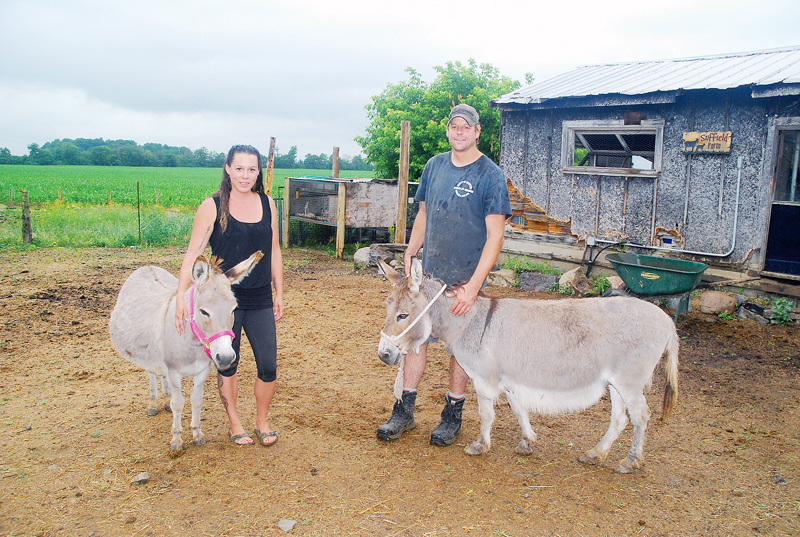Pictured here are Christina Suffel with Baby, and her partner Kevin Gebhardt with Momma. The donkeys originally lived in Quebec and would visit seniors in seniors’ homes to cheer them up; they are now retired. Morin photo
INKERMAN – North Dundas resident Christina Suffel can rest easy after the municipality sorted out her building permit woes.
Suffel had recreated a small part of her farming childhood by having a few animals around her property that her children could enjoy and look after.
She had been raised on her parent’s farm in Inkerman and wanted to be able to share the farming experience with her children.
In order to have an enclosed area for her two mini-donkeys and horse as well as some birds, she arranged to have two small buildings from another location dropped on her property. Along the way to creating the kind of place she wanted her four children to grow up in, she forgot to inquire about a building permit.
The township realized the lack of a building permit and advised her that without one she could not keep the buildings.
Another concern was that in North Dundas there is a bylaw that states that you need to have a minimum of five acres in order to have livestock on it. Suffel only had about three acres, but had made arrangements to ensure her animals were safe and could safely share the property with them.
It looked as if she would have to get rid of the building and the animals.
She turned to social media to get support and started up a petition asking the township to let her keep her animals.
She wrote, “I was born and raised on a farm in Inkerman in North Dundas Township. The farming blood runs through my veins as did all my family before me. My family has lived in the same house for 153 years minus about two years when it was sold to someone else after my father passed away. It was sold to a big farmer who only wanted the land for crops so they severed. I bought back my family homestead with my four children in tow to give them the experience of farming that I once had.”
The need for a building permit was easily dealt with. The next hurdle was the township bylaw that addressed the relationship between acreage and animals.
Between the two issues Suffel felt discouraged.
“The old Mountain Township bylaw stated I would have only needed two acres but this changed literally six months before I had moved back into my family homestead. I own almost three acres,” she said.
The municipality was caught between a rock and a hard place.
Social media had a great deal to say about the situation and most of it portrayed the township in a negative light. But there are two sides to every story and social media sometimes presents only one.
Mayor Tony Fraser said, “There are things that we have to react to and other things that we need to be proactive with. He said some issues are driven by complaints and if there are none, there is no need for the township to do anything.
“If it is a health and safety issue we will be proactive, and if it is a building issue we have to be proactive so that ensures the safety of the people in the building. We need to be proactive, we cannot wait for someone to complain about a health and safety issue.” he said.
He said the issue was all about a building code violation issue, “but that has been resolved.”
“We have never received a complaint about the animals,” said Fraser.
He noted that the Suffel property is surrounded by farmland. “I am glad we were able to move on with other matters,” he said.
The township cancelled the order for livesock removal but stated in a letter to Suffel: “The township does not intend to pursue the livestock issue at this time, as no written complaint concerning livestock was received, however, should the township receive a written complaint concerning the livestock, a file will be opened.”
Suffel is relieved the issue has been resolved but still wants to move forward with asking council to consider changing the bylaw in the future. She has collected about 4,000 names for her petition on Facebook, asking for a change in the number of acres required to have a small number of livestock on a property.
In the past, a concern about livestock animals on small properties was about where manure was stored and handled and well water protection. In Suffel’s case she has arranged with the people who bought her parents farm to deal with the manure issue.

Joseph Morin is the Editor of the Eastern Ontario AgriNews, and the Record. He is, despite years of practice, determined to eventually play the guitar properly. He has served the Eastern Ontario community as a news editor, and journalist for the past 25 years with the Iroquois Chieftain, Kemptville Advance, West Carleton Review, and Ottawa Carleton Review in Manotick. He has never met a book he did not like.









